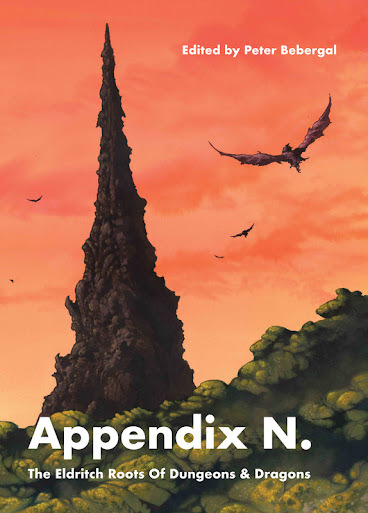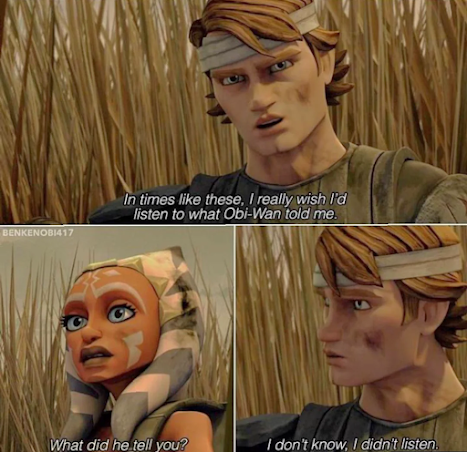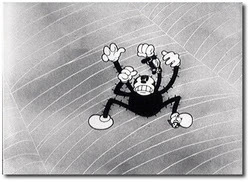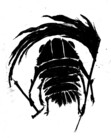A Review of 'Appendix N: Weird Tales From The Roots Of Dungeons & Dragons'

Weird Tales From The Roots Of Dungeons & DragonsRevised and Expanded EditionEdited by Peter Bebergal
(Disclosure - Strange Attractor Press sent me this forfree, and I sped up the review because they are one of the groups behind theexhibition I am attending on Saturday. In other respects, I think and hope myreview is accurate and indifferent.) (Also I don't usually do this and have toomany books, please do not send me books).
 Mark Schultz
Mark SchultzThe Fiction Of The Body And The Now
"'Then you are after the gem, too?'
'What else? I've had my plans laid for months, butyou, I think, have acted on a sudden impulse, my friend."
- Tower of the Elephant
Intelligence, impulsivity and the language of immediateaction; even pairs of heroes don’t discuss much what they have done, what theyare doing or will do. A handful of words are all that’s required and thestories are short, and are better for it. All of a character must vibrate in a fistof paragraphs, a cupful of deeds, and spring from the page, immediate andclear.
In longer stories the same souls might feel like fools.They would need.. background, complex long-term relationships, god forbid, asocio-political viewpoint? (Some have a bit of this).
In a short story that only has enough room for immediateactions, those actions become the moral truth of the tale, something oddlysimilar to the opening games of a D&D group, where the 'Characters' barelyexist yet, and the only real truths about them are; who will stick their handin this jar, and who refuse? Who will be the first through the door and whowill be right behind them? (and who will carefully be a long way behind them?).Who will be the first to suggest torturing that goblin, who first to provoke afoe and who first to negotiate? Who will run and who stand, should the day goawry? Action is the axis of a character, everything else just spins aroundtheir deeds.
Impulsivity, immediacy and atavism, but always withintelligence, sharp wits and keen senses. These stories are about thingshappening now. Too late! In the time it took you to read this sentencethe Barbarian has killed a man and moved to another scene.
And they are of the body. These heroes have noextra-material powers and less manipulations. (Cugel, Elric and some others area counterpoint). They are their bodies, which makes thought and actionone. A strong strand of the genre, (if this is one), is the pleasure of havinga body and doing things with it. The first and most precious object of a galaxyof things.
Good Because They Are Great, Not Great Because They Are Good
"Suddenly the Mouser began to feel frightened,not for himself at all, but for the girl. Her terror was obviously intense, andyet she must be doing what she was doing - braving her "queer andfearesome grey giant" - for his sake and Fafhrd's. At all costs, hethought, she must be prevented from coming closer. It was wrong the she besubjected for one moment longer to such horribly intese terror." –Fritz Lieber, the Jewels in the Forest.
It surprised me how relatively 'good' many of the heroesare. In large part these are self-interested thieves that defeat evil. The GreyMouser enters the Tomb of Urgaan to steal its jewels, but, on witnessing a girlin danger, leaps out to aid her. In Tower of the Elephant, Conan’s emblematictale and a holograph of the genre, heonly kills one man, and the foe draws first. For the rest he fights animals,and the villain dies through magic power, delivered by the hero, but the vengeanceof a slave. Conan climbs the tower ready to rob, to murder, a sorcerer,discovers what he thinks a demon, fears it, hears its tale, weeps for itssorrow and delivers its revenge. It’s not that he is 'good', but good results.Paul Andersons Hauk is a Dane, but not a murderey Viking, he fears the Ghoulhis father has become, but ends up saving the community, with BRAWN, (the body!the body!). Tanith Lees Cyrion adventures for the pleasure of it, but defeatsmultiple evils and frees a city from terror. He has been promised jewels andthere are tonnes for the taking;
"Cyrion opened the leather bag, and released thetreasure on the square, for adults and children alike to play with.
Empty-handed as he came, Cyrion went away into thedesert, under the stars." – Tanith Lee, a Hero at the Gates
In 'The Tower of Darkness', David Masons Marcus andDiana, (the only functional couple in these tales, and nearly the only sexualand romantic relationship), enter a city wearing the results of their lastrobbery, laden with ill gotten gains they are waylaid by vampires, defeat themand free the city. Manly Wade Wellmans Kardios washes up in a community ofGiants, punches one in the face, then fights a cosmic horror in a cave to savethem all. Why? For the adventure. Ramsey Campbells Ryre has too much sympathyfor slaves and too much hatred for slavers, there would be no story if hedidn't. Turjan of Miir is an amoral sorcerer, and barely the protagonist of hisown tale, Vance was ever-cold to the touch, but the end of his tale is that amis-made woman breaks out of her self-confinement and sets of to tell her ownstory. C.L. Moores Jiriel of Joiry comes the closest to having a complicatedmotivation and it leads her to victory and doom.
Elric really stands out as being a little shit. Insteadof doing, he manipulates others, instead of doing directly, heschemes, instead of the (rare), but even-handed sexual relations of the others,he wants to bang his drugged up sister. He abandons allies, calls up demons.Worst of all, he bleats and complains(!) He is not even being wry andsardonic about it, he is actually whining. Astonishing. (Really Elricslife-story should have ended with him building a huge dungeon full of perversetraps and twisted moral lessons, then going into it, burying it for a few millenniaand dying in it. He is the type for it.) Moorcock did set out to subvert ourexpectations and he does. His Elric is a perfect mirror in morality,relations and most importantly of all, in attitude of action, the way he livesin the world, to the real heroes. For if one thing defines a Sword and Sorceryhero, it is their willingness to take a BIG risk, right now, for a reward whichmay not be there - in doing so they often lose treasure, but some great evil isdefeated and the world made safer. (Apart from Elric who is a whiney villain).
A touch of Beowulf; these tales are pseudo-stories of animagined Pagan ethic, told by slippery types born into an urban world and a post-Christianmorality. The heroes do not dream of 'good' and 'evil', but the soul of thestory often does despite them. After all, who is likely to have blazing gems?Usually bad people. Well, they are written for us after all, and if we saw themorals of Antiquity in full, I do not think we would like them. Or buy the nextissue. Fake Pagan Tales! Many such cases!

A World Of Things And Of The Tales Of Things
"It was woven from the tresses of dead women,which I took from their tombs at midnight, and steeped in the deadly wine ofthe upas tree, to give it strength." - Tower of the Elephant
It’s never just a rope. Or just a sword, (so manyswords), or a gem, tower, mysterious powder, seeing-lens, magical orb, curiousring and more - it is where they come from. Yes there is an element ofFlaubert;
"One who possesses so vast an accumulation ofwealth is no longer like other men. While handling his riches he knows that hecontrols the total result of innumerable human efforts - as it were the life ofnations drained by him and stored up, which he can pour forth at will."
But these objects are stories too, they are nearly wordsor poems of their own. Like the rope of Taurus the Nemedian, (and who knows ifthat story, or any of his stories, were true, but he had one for everything heused), they are like the threads of a multicoloured woolly jumper, and if youpull on the thread, the whole jumper tenses and shifts. So these little talesbecome windows into vast worlds, disposed with a sprinking of phrases. Alwaysdo greater mysteries loom and stranger adventures link, told not in general butthrough the substance of things. And Things are things we need in games.Especially in the verbal-near-infinity of natural language and immediatecoherent use that makes up both the tools and tricks of Fairy Tales and the encyclopedialikeengine of Dungeons and Dragons.
"'This meat is excellent,' said Kardios. 'What isit, Enek?'
'The hind foot of an elephant, if you know whatelephants are.'
'We had them in Atlantis, for parades and for haulingstones and timbers, but I never ate elephant before.' Kardios took anothermouthful. 'It’s as tender and juicy as fine pork.” - Manly Wade Wellman,Straggler from Atlantis.
If there was a map of these rare connected places, itwould be different, so again the game must differ from the tale. For the worldof a game must be systematised, with concrete places, and things between thoseplaces. In truth the world of sword and sorcery, even of the big sagas oflinked tales, tends to be of hidden cubism, which is what these artefacts,actually are; little windows, pleasing fragments of a larger reality, callingyou ever-on, but seen only through these tiny gaps. The act of goingever-on, belongs to the game, not the tale. In that and that alone are we alikethe heroes.
Strangeness Lovecraft and the Uknown
Good god there is a lot of Lovecraft. I mean there is alot of Lovecraft even beyond his own stories. He exploded over the scene like aslime-volcano. Never again will we have just an ancient city or mysteriouself-land, now it is to be an ELDRITCH city EONS (not millennia) old, and aDREAMLIKE OTHERWORLD.

While always inventive, relatively few of the writers canmanage Peak Strangeness, and indeed if we crossed over only a little more intosurrealism, fairytale or impressionism, the tales would become unworkable, nolonger moving through the gateways between a known and unknown world, where thelogic and experience of one can be taken into the other, and thence make itactionable, but would become only dreams, which can be experienced, but notused.
Lovecraft’s epochal, cyclopean supers-strange mega-millenniaold cities are actually pretty hard to explore in-game. They can be explored ina story because in that story the sheer weight and streamlike bubblingintensity of the flowing visions of sculptures, buildings, half-seen horrors,vapours, lights, sounds and wild imaginings, makes the procedure of explorationmore a poem-of-things. (I do not say it’s impossible, only that it ishard and likely less rewarding, over time, than you might imagine. After seeingand experiencing six or seven unutterably strange visions, glancing over threeor four globs of greenish tarnished gold that might or might not be tools ortreasures of a forgotten eon, running from one squamous blob into a wingedtentacle thing; it can get uninteresting.)
We generally don't want to, and perhaps can't"explore" the true-unknown. If we knew about it, it wouldn’t beunknown for a start. But more; human exploration is driven by human needs fromthe known and understood human world. You explore to get stuff or knowledgethat means something in the world you know. If there is nothing human where youare going, exploration will be limited, and more an expression of existentialwill than anything else.
We explore the Antarctic, and we explore the moon, andvia probe, the planets, but there is as-yet, nothing human there, so we don'tactually explore that much or with great intensity. As we learn more, and gomore, slowly, over time, we might discover not the places, but ways of seeingand using them that make them fungible to human culture. Then, we willaccelerate, going more and more, learning more and leaving more human residuum behindin those strange places, till they become just places, not boundaries orwonders. The true frontier will have moved on, to the edge of our sight, whereit fades into black.
But really when we explore, in the cool fun way thateveryone thinks of when they want to play 'explorer' we actually want to go toplaces humanity has already been, and where humans have done a lot of humanthings, (like mining gold, building giant stone heads, setting up therecruitment of hot priestesses, etc), and we want to 'discover' thoseplaces - places full of human stuff. (And then possibly steal it and take ithome).
As Rumsfeld said; there is the known unknown and then theunknown unknown. Or as the meme sayeth;

Dusanay and the Super-Real
Dunsanay is perhaps the most brilliant and inventive ofall the writers shown and his tale 'The Fortress Unvanquishable Save forSacnoth', begins with a primal alliance of folktale and epic; a moving fortresssending forth evil dreams, its only counter, a blade hidden in the spine of adragon-crocodile. The only way to defeat the crocodile is to bait it for threedays straight, smacking its vulnerable nose, without being eaten, till itstarves. Then to melt the beast, draw forth the steel, and sharpen in upon oneof its eyes, the other eye being affixed to the pommel, where it will watch fordangers.
It's almost too good to be D&D.
Then a march through a wonderous nightmare castle,meeting layers and layers and layers of fairytale guardians and satanicinhabitants. Like most of these tales the journey is too linear to make a gooddungeon on its own, but that's easy to adapt, in concept at least, it is alsovastly and beautifully strange, surreal, heightened. A potent blend ofhyper-theatre, opera, and perhaps awareness of very early film and photography?Perhaps early animation?
"Thereat the black hair that hung over the faceof the spider parted to left and right, and the spider frowned; then the hairfell back into place, and hid everything except the sin of the little eyeswhich went on gleaming lustfully in the dark. But before Leothric could reachhim, he climbed away with his hands, going up by one of his ropes to a loftyrafter, and there sat, growling."
This, surely is a Silly Symphonies spider?

C.L. Moore - A Map Of Hell.
"She crossed a brook that talked to itself in darknesswith that queer murmuring that came so near to speech .. she paused suddenly, feeling the groundtremble with the rolling thunder of hoofbeats approaching .... a white blur flung wide across thedimness to her left, and the sound of hoof-beats deepened and grew. Then out ofthe night swept a herd of snow-white horses. Magnificently they ran, manestossing, tails streaming, feet pounding a rhythmic, heart-stirring roll alongthe ground. She caught her breath at the beauty of their motion...
But as they came abreast of her she saw one blunderand stumble against the next, and that one shook his head bewilderingly; andsuddenly she realised that they were blind ... and she saw too their coats wereroughened with sweat and foam dripped from their lips, and their nostrils wereflaring pools of scarlet. Now and againone stumbled from pure exhaustion. Yet they ran, frantically, blindly throughthe dark, driven by something outside their comprehension.
As the last one swept past her, sweat-crusted andstaggering, she saw him toss his head high, spattering foam, and whinny shrillyto the stars. And it seemed to her that the sound was strangely articulate.Almost she heard the echoes of a name - "Julienne! -Julienne!"." - C.L. Moore from 'Black Gods Kiss.
All this within a dreamlike otherworld accessed through adimensional corkscrew, not perceivable to one still wearing the cross of christ.Is it fairyland? Nightmare? Hell or one of Lovecrafts pocket realms? Whereverit is, it is a near-mappable point crawl with particular distinct locations,routes between them, particular modes of access, residents within and randomshifting encounters without. Something surprisingly rare to find in full amidstthese tales of inspiration

The Unlikeness Of The Inspiration And The Game
These stories which provide the impulse or drive to playD&D are very deeply unlike the experience of playing D&D in someinteresting ways.
No groups or protagonist gangs. (Would make zero sense ina short story, even Elrics long tale has a few too many in it) The most we getis a pair. It speaks to something slightly charming in humanity that one of ourmost developed and pleasurable ways of experiencing imagined worlds takes placethrough the medium of a conversation - because we not only want to bring ourfriends along, but doing it in a group makes the imagination more realto us. Because we are a social species, and the living presence of a complexgroup is to us really another kind of meta sensing organ, like a super-eye.
There are few dead-ends; some mazes happen (I onlyremember one; the harbour maze of the Elrics Dreaming City), but they aresolved in one go. There is no back-tracking, no finding of keys, making maps,none of what's grown to be the baseline of a procedural culture of dungeonexploration - again fun to do (sometimes), not to read about. Mostdungeons in these stories are sequences of rooms. Others are small closedspaces.
There is no advancement really. Characters might get abit better at things, get some cool items, then if the tales go on long enough,age and get a bit worse, but generally people occupy a gentle curve ofcapacity. Neither is there much specialisation-by-profession or by type -anyone can attempt anything. You got yourself a body don’t you buddy?
All these changes are adaptations between two forms ofart, the narrative and the game, and even between two experiences of time;One is linear, though containing twists and turns, it has no branching pathsand cannot be explored. There are no choices to make except for when and whereto put down the book or pick it up, for the whole world can be held in onehand, paused, reversed, stored, forgotten and re-experienced whenever you wish.The other; multiplex in experience yet bound in real-time. Here you cangenuinely go one way or another, or even just leave the dungeon. (Butyou may not be able to return. You need your friends to play this game,and a DM, and a bunch of other crap, and they are not infinitely or eternallyavailable. Your access to this world is much more bound by materialcircumstances in our own). Need Conan truly kill that goblin? It is a reality madeof decisions, its substance being choices, and what seems to be itssubstance, in truth, merely curtains and theatre scenery.
Though linked by the human imagination, by a desire for adventureand to see new lands, and by a love of Things, and of heroes, and many otherthings, the sheer chasm between a narrative and a game is very great, andgreater still because an illusion lies over it, so that few see it for what itis.
Milk On A Warm Day
The Sword and Sorcery exemplified by Conan and 'Tower ofthe Elephant', (and the best Conan stories really are very good), and byLovecraft, goes off quickly, even instantly, like cheese in summer or yoghourtin a sauna, when taken from the hands of its Masters. Like a clay pot, its relativelyeasy to make something that holds water, and rare grace to make true beauty.
These are such tender confections. And they don’t seemlike it. Because the tales are atavistic, heroic, inventive and quick,many lesser writers think they can do them, and because the basic costuming andappearance are so fungible, it’s easy to dress as them.
Kind of like, if you remember the Summer after 'The DarkKnight' came out, Heath Ledgers Joker appeared in photographs in every party,festival, cosplay thing, the guy was fucking everywhere - edgelord and theatrekid combined to make Joker-pressions the substance of the age. Because, likeHoward, and Lovecraft, the outward expression is easy to simulate. But all ofthose theatre kids and edgelords were about as much the Joker as many laterwriters were and are Lovecraft and Howard, or as much as 'Wheel of Time' is likeLord of the Rings, which is; it isn't at all, it’s merely convergent evolution,like penguins and dolphins being the same shape underwater. One in ten writersseem to understand that Conan is a relatively psychologically subtle characterwho just doesn't introspect much and does things with immediacy, or thatLovecraft thinks this shit is genuinely terrifying and you should be genuinelyscared of Infinite Things.
Vandermeers Afterword
"What if the Gnoles were non-binary?"
Is an actual line from this. From this you likely know ifyou want to read it.
Thence The Text
In substance, merely stories, and such stories as the'true heads' amongst you have probably already read and read the Grognardiareview of, and the RPG.NET thread of complaints about, I mean you are likelyfive layers deep on most of this stuff already, if I know you are all.
Yet you ‘Heads’ are still the most likely to actually buythis thing. Because they are good stories, with a few rarities, and thebook is a pleasant object, and its particular arrangement, and point of view,splaying forth the paelo-dreams of Dungeons and Dragons and arranging themnicely, in a little Wunderkammer, may amuse.




